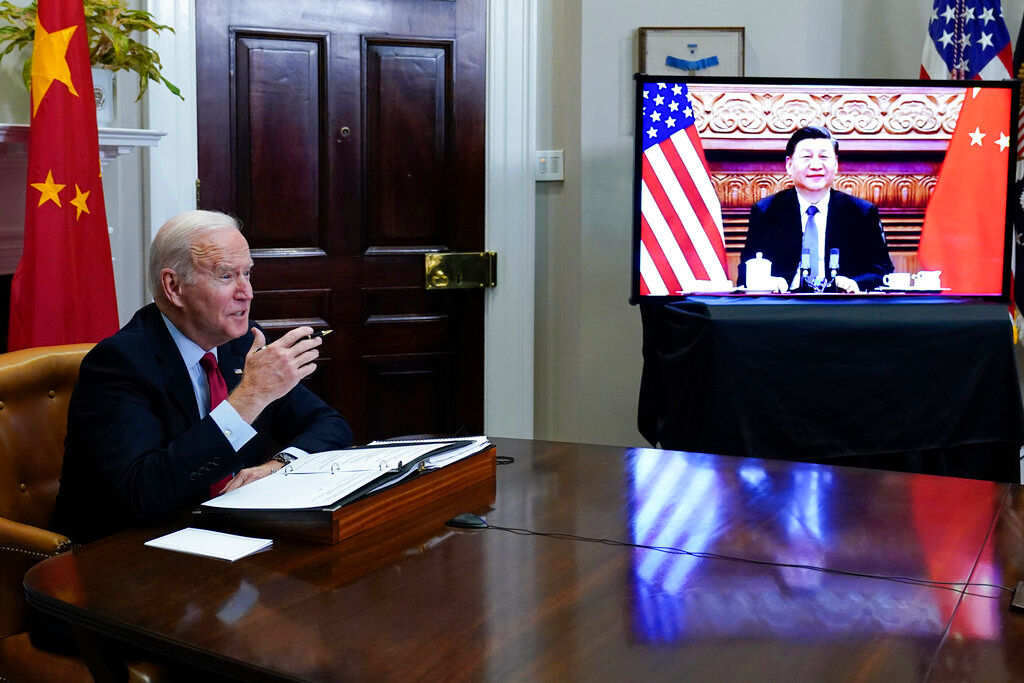Chinese President Xi Jinping on Monday called for improved communication with the United States to build consensus and strengthen their bilateral ties during the much-anticipated virtual meeting with American counterpart Joe Biden.
The two leaders met via video conference amid rising tensions in US-China relations. Biden has slammed Beijing for human rights violations against Uyghurs in northwest China, repression of democratic protests in Hong Kong, military aggression against Taiwan, and other issues. Meanwhile, Xi’s deputies have slammed the Biden administration for interfering in what they see as internal Chinese affairs.
“I stand ready to work with you, Mr. President, to build consensus, take active steps and move China-U.S. relations forward in a positive direction,” said Xi, who called Biden his “old friend.”
Meanwhile, Biden said his aim was to ensure competition between the two countries “does not veer into conflict”.
“It seems to be our responsibility as the leaders of China and the United States to ensure that the competition between our countries does not veer into conflict, whether intended or unintended, rather than simple, straightforward competition,” Biden said at the start of the meeting.
Biden would have liked to meet Xi in person, according to the Associated Press, but the Chinese leader has not left the state since the coronavirus outbreak began.
The White House proposed a virtual meeting as the next best thing to allow the two leaders to have an open and honest discussion about a variety of issues plaguing their relationship.
The top issue for the talks, according to Chinese officials, will be Taiwan. Tensions have risen as the Chinese military has sent out an increasing number of fighter jets near Taiwan, which Beijing considers to be part of its territory.
“The Taiwan issue concerns China’s sovereignty and territorial integrity, as well as China’s core interest,” Chinese Foreign Ministry spokesperson Zhao Lijian said Monday. “It is the most important and sensitive issue in China-U.S. relations.”
Biden will follow the US’s long-standing “One China” policy, which recognises Beijing but allows for informal relations and defence ties with Taipei, according to the White House. Chinese military forces conducted drills near Taiwan last week in response to a congressional delegation from the United States visiting the island.
With the Winter Olympics set to take place in Beijing in February and Xi expected to be elected to a third five-year term as president by Communist Party leaders next year — a first in recent Chinese history — the Chinese leader may be looking to stabilise the relationship in the near term.
White House press secretary Jen Psaki added that the “condensing of power” in China made the leader-to-leader conversations essential.
Beijing is also concerned about slowing economic growth and a looming housing crisis.
At the same time, Biden is attempting to strike a balance on the most important foreign policy issue he faces, despite declining polling numbers at home due to concerns about the lingering coronavirus pandemic, inflation, and supply chain issues.
Despite his domestic problems, White House officials claimed that Biden entered his meeting with Xi in a strong position.
Earlier Monday, Biden signed into law a $1 trillion infrastructure bill, legislation to upgrade the nation’s crumbling infrastructure that the Democrat argued is crucial for the U.S. as it seeks to retain a competitive edge over China.
“Because of this law, next year will be the first year in 20 years American infrastructure investment will grow faster than China’s,” Biden said. “We will will once again have the best roads, bridges, ports and airports over the next decade.”
The White House set low expectations for the meeting with Xi: No major announcements or even a joint statement were anticipated.
With inputs from Associated Press






